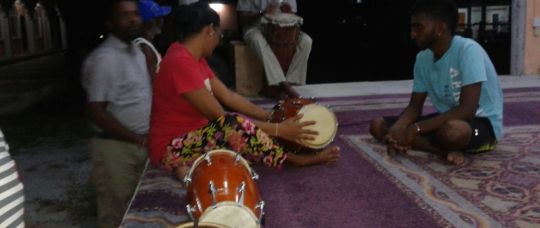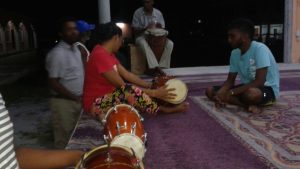Future Generations University believes in the importance of supporting its alumni and creating a community of changemakers. It is for this reason that Future Generations Global Network awards a number of collaboration grants every year for which alumni can apply to implement projects that embody our philosophy and demonstrate the SEED-SCALE method. This week, we hear from Rohan Sagar and Suzanne Munro, who received one of these grants in 2016 to fund their research into cultural poverty reduction…
The Cultural Poverty Reduction as a Strategic Policy project funded by Future Generations Global Network was a response to the ethnic and social landscape of Guyana. This project was conceptualized and implemented by two alumni, Rogan Sagar and Suzanne Munro, of Future Generations University (then the Graduate School), Class2014. The project implementation period commenced in August and concluded December2016, and was built around three main components: (a) Research, (b) Applied Ethnomusicology, and (c) Observations, which was an application of Evolutionary Psychology. Essentially, the project as a research praxis validated the main hypothesis encompassing ethnic and race relations and the outcomes validated the application of Applied Ethnomusicology as a possible bridge between present political structural policies and a culturally based epistemic.
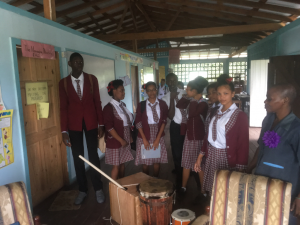 Our research component sought to establish a baseline of cultural knowledge bymeasuring depreciation (of fixed variables or not known by the respondent). According to research articles on Evolutionary Psychology and Music Psychology,”‘music is the main marker upon which identity is constructed.‘” Therefore, according to the research objectives, the level of knowledge of ethnic based traditional musics will be an indicator of the broader levels of cultural knowledge. The data is clear that interethnic as well as intra–ethnic cultural awareness exists at very low levels, with less than25% of the respondents actually aware of their own ethnic identity constructs. The majority of the respondents(75%) also indicated lack of awareness of the identity of specific cultural tools indigenous to their specific social group, and could not relate to indigenisable sonic designs. In Evolutionary Psychology this phenomenon could be referred to ‘psychophysical’ and provides a referential marker located in the absence of being rooted within one’s own identity; this response then became a referential point of departure to locate from the respondents own experiences their relationships to other groups.
Our research component sought to establish a baseline of cultural knowledge bymeasuring depreciation (of fixed variables or not known by the respondent). According to research articles on Evolutionary Psychology and Music Psychology,”‘music is the main marker upon which identity is constructed.‘” Therefore, according to the research objectives, the level of knowledge of ethnic based traditional musics will be an indicator of the broader levels of cultural knowledge. The data is clear that interethnic as well as intra–ethnic cultural awareness exists at very low levels, with less than25% of the respondents actually aware of their own ethnic identity constructs. The majority of the respondents(75%) also indicated lack of awareness of the identity of specific cultural tools indigenous to their specific social group, and could not relate to indigenisable sonic designs. In Evolutionary Psychology this phenomenon could be referred to ‘psychophysical’ and provides a referential marker located in the absence of being rooted within one’s own identity; this response then became a referential point of departure to locate from the respondents own experiences their relationships to other groups.
To understand and diagnose the openness or receptivity of respondents to multiculturalism and multiethnic universals, the project relied on the principles of Applied Ethnomusicology. Here the process was guided by the alumni and two facilitators: Mr. Somdatt Ramessar and Mr. Handel Neptune. The scope of this component was confined to observation and was tested on the youth demographic. According to new studies on music and its impact on the brain, specific rhythms and melodic designs usually generate psychophysical indicators on which was premised the main hypothesis. What both the investigators and facilitators noted was the presence of genuine positive reactions to rhythms and melodic designs that could be defined as both indigenous and endogenous. We found this behavior not to be surprising given the existence of evidence of cosmopolitanisation within Guyanese society. Two percussive rhythmic pieces identifiable to two ethnic groups, Africans and East Indians, the Patois Hand and Keherwa Taal or(8 beats) as well as two vocal materials, Ba Ta Taa and Harey Krishna were used in this exercise . Additionally, the Amerindian percussion instrument, the Sambura, was used to interconnect as a part of the overall orchestral arrangements.
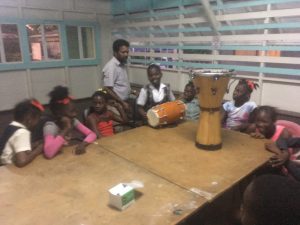 What the researchers and facilitators did note as an interesting find was the dichotomy between the research findings (the less than25% knowledgeable marker) and the observational high ratio positive response. The research seems to suggest that the demographic in question, the youth, seems to be more susceptible to endogenisation, a process likely to have generated greater traction outside of their primary place of habitat. What is yet to be discerned is the impact of this endogenous experience within ethnic enclaves, additionally the research protocol did not address or clarify this fundamental question. Guyana is often called the ‘land of six races’ which is often a source of pride and is a benchmark used to establish comparative distinctiveness between the high levels of co–existence here in Guyana and ethnic or race based conflicts universally. From the Amerindians, who it is scientifically accepted were the first settlers in this part of the world, to the other four ethnic groups who were forced migrants as a consequence of European colonial adventures and conquest, Guyanese have found a unique method to co–exist.
What the researchers and facilitators did note as an interesting find was the dichotomy between the research findings (the less than25% knowledgeable marker) and the observational high ratio positive response. The research seems to suggest that the demographic in question, the youth, seems to be more susceptible to endogenisation, a process likely to have generated greater traction outside of their primary place of habitat. What is yet to be discerned is the impact of this endogenous experience within ethnic enclaves, additionally the research protocol did not address or clarify this fundamental question. Guyana is often called the ‘land of six races’ which is often a source of pride and is a benchmark used to establish comparative distinctiveness between the high levels of co–existence here in Guyana and ethnic or race based conflicts universally. From the Amerindians, who it is scientifically accepted were the first settlers in this part of the world, to the other four ethnic groups who were forced migrants as a consequence of European colonial adventures and conquest, Guyanese have found a unique method to co–exist. 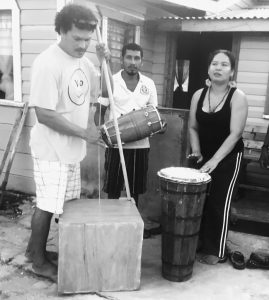 Out of this condition arose evidences of homogenous and heterogeneous communities, mix marriages and relationships, and the interethnic experimentation with the phenomenon, creolization. Creolization was for all intents and purposes a grassroots learning process when ethnic groups were forced to coexist, not deliberatively, but through the many life sustaining mechanisms, and knowledge and awareness essentially blossomed so that each one got to know the ‘other’ culturally. Some of these phenomena include social concepts as weddings, celebration of births and deaths, commerce, as well as sharing other ecological spaces. As Guyana progressed towards Independence political self–governance awareness was gaining traction amongst the citizenship and in1953 Guyana elected its first form of self–government after winning universal suffrage. But in1962-4 Guyana entered into a dark period as the country descended into civil unrest and riots, largely as a consequence of the fracture of the then single largest political party along ethnic lines.
Out of this condition arose evidences of homogenous and heterogeneous communities, mix marriages and relationships, and the interethnic experimentation with the phenomenon, creolization. Creolization was for all intents and purposes a grassroots learning process when ethnic groups were forced to coexist, not deliberatively, but through the many life sustaining mechanisms, and knowledge and awareness essentially blossomed so that each one got to know the ‘other’ culturally. Some of these phenomena include social concepts as weddings, celebration of births and deaths, commerce, as well as sharing other ecological spaces. As Guyana progressed towards Independence political self–governance awareness was gaining traction amongst the citizenship and in1953 Guyana elected its first form of self–government after winning universal suffrage. But in1962-4 Guyana entered into a dark period as the country descended into civil unrest and riots, largely as a consequence of the fracture of the then single largest political party along ethnic lines.In their conclusion the Cultural Poverty Reduction, project leaders wish to reiterate that the cultural policy research paper was designed and built in accordance with the 7 Tasks of the SEED–SCALE research method; the full research paper was submitted for publication in a peer-reviewed academic journal; other visual materials are also available on the first author’s website: www.socio–historicalethnomusicology–GUYANA.com. The project leaders wish to thank Future Generations Global Network for its support to help realize this project; additionally, project implementers are pleased to facilitate greater awareness of Future Generations University and its work worldwide.
 Rohan Sagar read for his Master’s Degree at Future Generations University, in his thesis he argued for a multicultural approach to music education in Guyana where he resides. Rohan is also an ethnomusicologist presently conducting investigations in the traditional musics of Guyana amongst the Native American, African and East Indian populations. His most recent project was research assistant to the Evolutionary Psychology project with Harvard University.
Rohan Sagar read for his Master’s Degree at Future Generations University, in his thesis he argued for a multicultural approach to music education in Guyana where he resides. Rohan is also an ethnomusicologist presently conducting investigations in the traditional musics of Guyana amongst the Native American, African and East Indian populations. His most recent project was research assistant to the Evolutionary Psychology project with Harvard University.
 Suzanne Munro is a graduate from the University of Guyana, where she studied Environmental Studies. Further development of her education took place in the obtaining of a Masters Degree in Community Change and Conservation through the Future Generations Graduate School. Ms. Munro has worked at Conservation International (CI) for over 10 years, where she focuses on grants management, community development, and conservation. Currently, she is with the Government of Guyana as a Procurement Specialist working under the Forest Carbon Partnership Facility (FCPF). When not at work, she is active in a small group of women that focuses on early exposure and availability to reading in young children.
Suzanne Munro is a graduate from the University of Guyana, where she studied Environmental Studies. Further development of her education took place in the obtaining of a Masters Degree in Community Change and Conservation through the Future Generations Graduate School. Ms. Munro has worked at Conservation International (CI) for over 10 years, where she focuses on grants management, community development, and conservation. Currently, she is with the Government of Guyana as a Procurement Specialist working under the Forest Carbon Partnership Facility (FCPF). When not at work, she is active in a small group of women that focuses on early exposure and availability to reading in young children.

